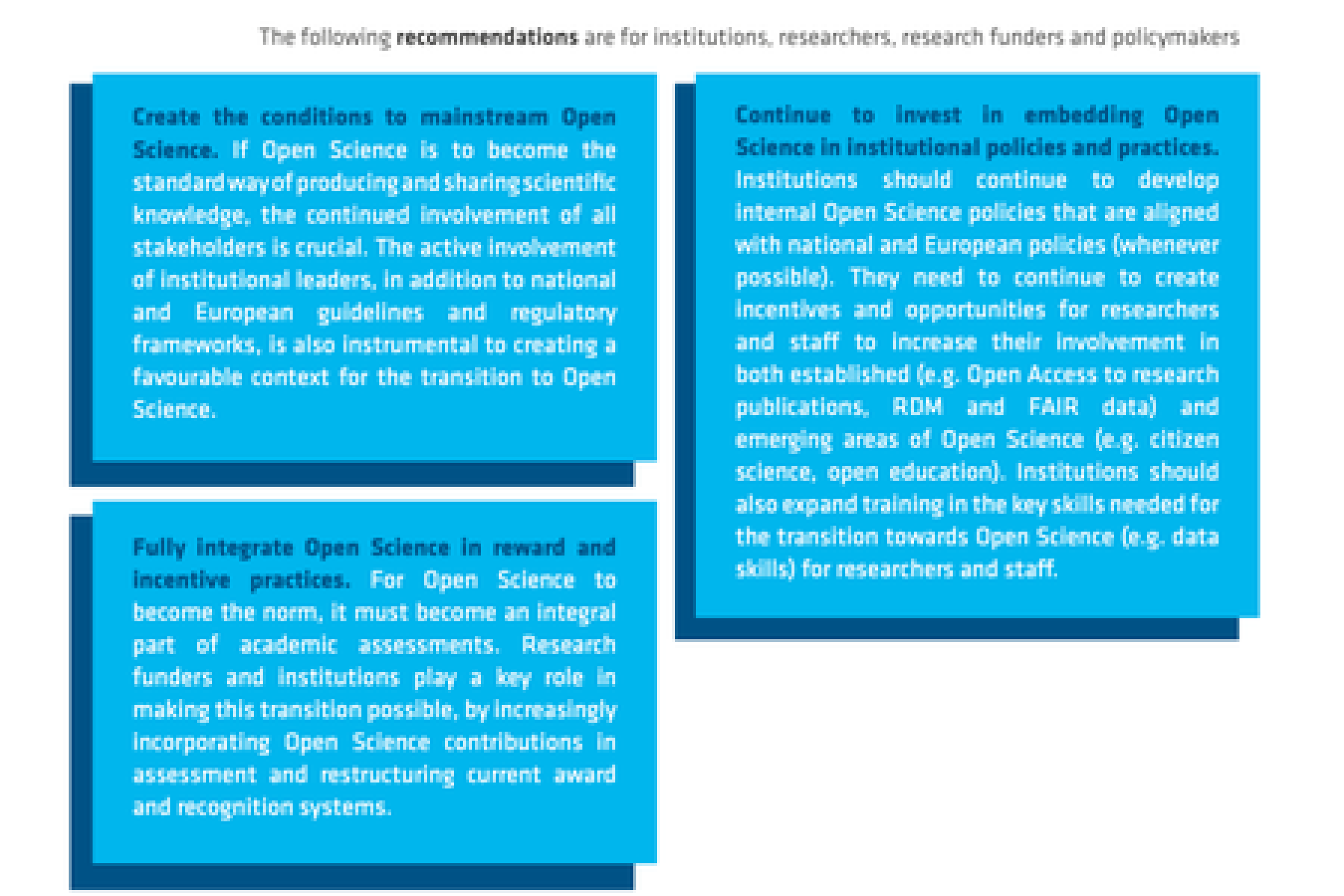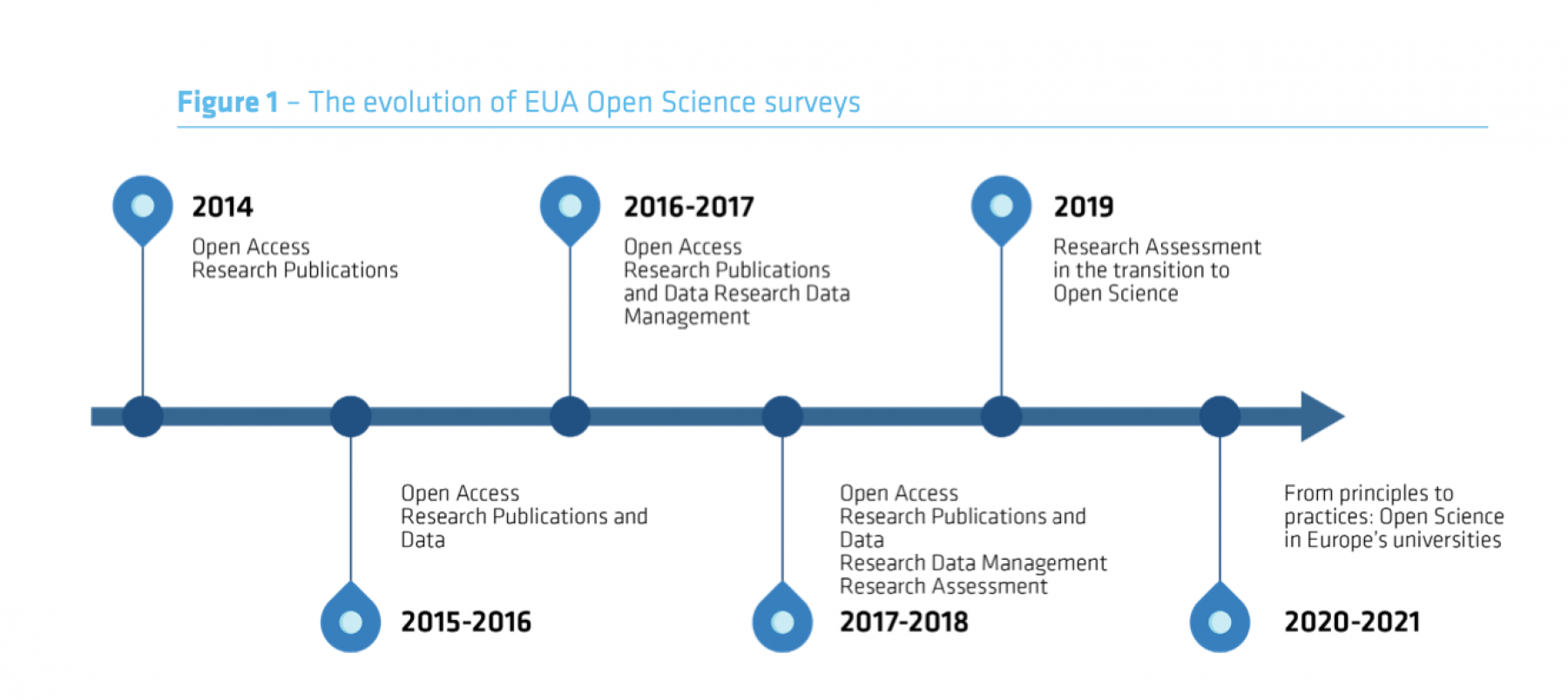Survey results assess development of Open Science at European universities
Open Science Survey 2020-2021 received 272 answers from 36 European countries
The Open Science Survey 2020-2021 report is now available on the website of the European University Association (EUA). The work presents the sixth edition of an annual survey that aims to understand the level of Open Science development in European higher education institutions, and to provide informed recommendations for institutions, researchers, funders and policy-makers to contribute to the transition to Open Science.
This edition of the survey focused on a range of aspects of Open Science, from established to emerging areas, and addressed questions to the participating institutions in order to understand the levels of importance and implementation of each area of Open Science within them.
Among the main results, the survey analysis reveals that:
- More than half (59%) of the investigated institutions assess the strategic importance of Open Science as high or very high. Open Access to research publications/results was considered highly important for 90% of the institutions; however, only 60% of them consider its level of implementation as high.
The gap between importance and implementation is even wider in data-related areas: the importance of data-related areas is rated between 55 and 70% of institutions, but high levels of its implementation are only between 15-25%.
- Among the participating institutions, 54% already have an Open Science policy, while another 34% are developing one. Only 9% of institutions do not have an Open Science policy or are not planning to develop one.
A more detailed analysis of the responses reveals that having an institutional Open Science policy is significantly related to the importance given to Open Science in the strategic priorities of the institutions. The lower the level of importance assigned in the response, the lower were also the levels of implementation of the related areas. The report shows in detail the levels of importance assigned to each area and the respective levels of implementation.
- Approximately 80% of institutions monitored the number of publications in their repositories and 70% monitored the articles published by their researchers in Open Access journals. Almost 60% reported monitoring the cost of publications by their researchers in Open Access journals.
- A total of 90% of participating institutions have their own repository, participate in a shared repository or both. For journal hosting or publishing platforms, this figure reaches 66%, and 57% for monograph hosting/publishing. It was further reported that 66% of the institutions interviewed participated in or supported Open Access publishing.
- Over 50% of respondents reported that research data skills were only partially available. Furthermore, all institutions that indicated no or partial data skills considered that more of these skills are needed at the institutional level.
- Approximately 50% of respondents are aware of Citizen Science and Open Education activities in their institutions - emerging areas of Open Science.
- On academic assessment and Open Science: in 34% of institutions, none of the elements of Open Science examined by the survey was included in academic assessments. Among the institutions that included Open Science activities in their assessments, 77% took into account the deposit of articles in repositories.
In conclusion, the results enable the authors to propose a set of recommendations addressed to different interest groups: institutional leaders and managers, researchers, librarians, as well as national and European policymakers. The research proposes recommendations related to the creation of conditions to make Open Science mainstream; the continuous investment to embed Open Science in institutional practices and policies; and the integration of Open Science in incentive and reward practices.
Besides showing the evolution of open science strategies and the maturity of their implementation in European research institutions, the survey also reveals emerging topics, such as the role of Open Science in evaluation methods, human resource management and the openness of science to society.
About the Open Science Survey
The Open Science survey is one of the activities that has been developed by EUA in recent years to help promote an open view of science, positioning the institution as an independent organisation that looks beyond specific policy contexts.
The survey focuses on strategies and actions carried out by universities in Europe. The current edition is the sixth in the series, and offers a detailed overview of the state of Open Science development in 272 institutions that agreed to respond - 226 came from EUA members and 46 came from non-members. The University of Coimbra is one of the participants, and is a Full Member of EUA, along with nearly two dozen other universities and higher education institutions in Portugal. The country contributed this year with a total of 10 responses from the different participating institutions.
More than 700 institutions have responded to the Open Science Survey over the six editions conducted so far. The anonymised dataset for the 2020-2021 survey is available on Zenodo.
The sixth edition of the Open Science Survey addresses open science in several, if not all, of its dimensions. The evolution of the issues covered over the years of the survey is shown in the figure below, taken from the report. Read the full document through this link.
The objectives of the Open Science survey 2020-2021 included: investigating whether there is a gap between the strategic importance given to open science and its actual implementation, identifying areas with greater gaps, and improving the understanding of the opportunities, challenges and obstacles to the institutions. More generally, the report provides evidence of the experience of European universities in Open Science.
| Read the report |
Check out the full EUA Open Science Survey 2020-2021.


